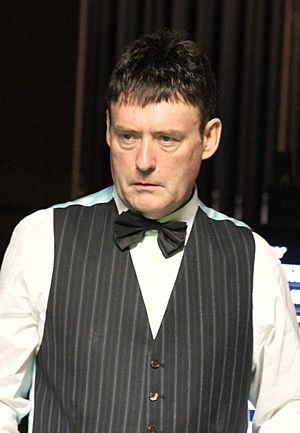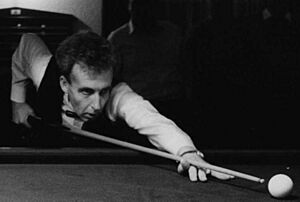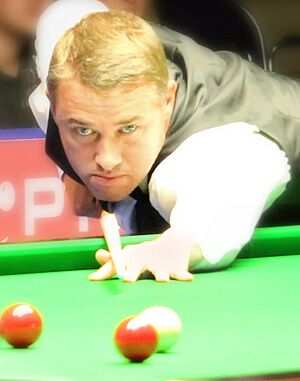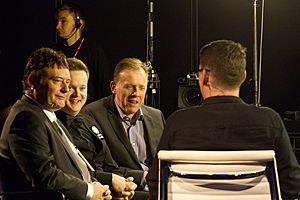Jimmy White facts for kids

White at the 2016 Paul Hunter Classic
|
|
| Born | 2 May 1962 Tooting, London, England |
|---|---|
| Sport country | |
| Professional | 1980–present |
| Highest ranking | 2 (1987/88–1988/89) |
| Current ranking | 93 (as of 8 May 2018) |
| Tournament wins | |
| Ranking | 10 |
James Warren White MBE (born 2 May 1962) is a famous English professional snooker player. He is known for his fast and exciting style of play, which earned him the nickname "The Whirlwind." He has won ten major tournaments called ranking events.
White is one of snooker's most popular players. He reached the final of the World Snooker Championship six times but was the runner-up each time. Despite this, he has won two of the three most important tournaments in snooker, known as the Triple Crown. These were the 1984 Masters and the 1992 UK Championship. He is also a four-time World Seniors Champion, winning in 2010, 2019, 2020, and 2023.
After turning professional in 1980, White quickly became one of the top players. He was a regular in the top 16 for most of the 1980s and 1990s. His highest world ranking was number two. He has made over 300 century breaks (scoring 100 or more points in one turn) and was the first left-handed player to score a maximum break at the World Championship.
Contents
Early Life
James Warren White was born on 2 May 1962 in Tooting, London. He went to Ernest Bevin School but was not very interested in his studies. He often missed school to spend time at a local snooker hall. There, he met another young player, Tony Meo. They became friends and would travel to different places to play snooker.
When he was 13, White played against his hero, Alex Higgins. White later said that watching Higgins play was the reason he started playing snooker. He even copied Higgins's exciting style of play. In 1979, just before his 17th birthday, White won the English Amateur Championship, becoming its youngest-ever winner.
Career
Rise to Fame (1980–1991)
In 1980, White won the World Amateur Championship and turned professional. In his first season, he made it to the 1981 World Championship. The next season, he won his first professional title, the Scottish Masters.
At the 1982 World Snooker Championship, he reached the semi-finals and played against his hero, Alex Higgins. It was a very close match, but Higgins won the final frame to go to the final. By the end of the season, White was ranked 10th in the world.
In 1984, White won the Masters, his first Triple Crown title. He beat Terry Griffiths in the final. That same year, he reached his first World Championship final. He played against Steve Davis and lost a close match 16–18.

White won his first ranking title at the 1986 Classic. He also won the Grand Prix and the 1987 British Open. These wins helped him reach number two in the world rankings, just behind Steve Davis.
From 1990 to 1994, White reached the World Championship final for five years in a row. This was an amazing achievement, but he lost every time. Four of those losses were to his great rival, Stephen Hendry.
The Whirlwind's Peak and Challenges (1992–2002)
The 1990s were full of highs and lows for White. In 1992, he won the British Open and the European Open. At the 1992 World Snooker Championship, he made history by scoring a maximum break (the highest possible score of 147 in a single frame). He was only the second player to do this at the World Championship.
He reached the final again that year and led Stephen Hendry 14–8. But Hendry made an incredible comeback, winning ten frames in a row to win the title. Later in 1992, White won the 1992 UK Championship, his second Triple Crown title.
White faced Hendry again in the 1994 World Championship final. The match went to a deciding frame. White had a chance to win but missed a key shot. Hendry then cleared the table to win 18–17. It was a heartbreaking loss for White.
During the mid-1990s, White had a serious illness but recovered after treatment. His form started to dip, and in 1997, he dropped out of the top 16 in the world rankings for the first time in 15 years. However, he made a comeback and reached the quarter-finals of the 1998 World Championship, beating Hendry along the way.
Later Career and Seniors Success (2003–Present)
In 2004, White won the Players Championship. This was his tenth ranking title and his first in over a decade. It proved he could still compete with the best players. His last appearance in the main stages of the World Championship was in 2006.
After falling down the rankings, White began to play in the World Seniors Championship for players over 40. He won his first title in 2010, beating Steve Davis in the final. He has since become the most successful player in the event's history, winning again in 2019, 2020, and 2023.
Even in his later years, White has had moments of success on the main tour. In 2017, the snooker authorities gave him a special "invitational tour card" to allow him to keep playing professionally, recognizing his importance to the sport.
In November 2022, at age 60, he reached the last 32 of the 2022 UK Championship. He became the oldest player to get that far in the event since 1993. The crowd gave him amazing support, which he called "magical." His good performances earned him a new tour card, allowing him to continue his long career.
Legacy
Jimmy White is known as 'The People's Champion' because he is so popular with fans. Many people consider him one of the greatest players to have never won the World Championship. His exciting, attacking style of play made him a joy to watch.
His ten ranking titles place him among the most successful players in the sport's history. He was added to the World Snooker Tour Hall of Fame in 2017. A sports writer once said that White is "probably, the most popular player in the history of the sport."
Personal Life
White has five children. He is good friends with Ronnie Wood from the music group the Rolling Stones.
In 1998 and 2014, White released autobiographies about his life. He has also appeared on television shows, including the reality show I'm a Celebrity...Get Me Out of Here! in 2009, where he finished in third place.
White has also been a commentator for snooker coverage on TNT Sports.
Career Finals
White has played in many finals during his long career. He has won 10 ranking titles and 27 non-ranking titles.
Ranking finals: 24 (10 titles)
| Legend |
|---|
| World Championship (0–6) |
| UK Championship (1–2) |
| Other (9–6) |
| Outcome | No. | Year | Championship | Opponent in the final | Score |
|---|---|---|---|---|---|
| Runner-up | 1. | 1982 | Professional Players Tournament | 5–10 | |
| Runner-up | 2. | 1984 | World Snooker Championship | 16–18 | |
| Runner-up | 3. | 1985 | Matchroom Trophy | 10–12 | |
| Winner | 1. | 1986 | The Classic | 13–12 | |
| Winner | 2. | 1986 | Grand Prix | 10–6 | |
| Runner-up | 4. | 1987 | The Classic | 12–13 | |
| Winner | 3. | 1987 | British Open | 13–9 | |
| Runner-up | 5. | 1987 | UK Championship | 14–16 | |
| Runner-up | 6. | 1988 | International Open | 6–12 | |
| Winner | 4. | 1988 | Canadian Masters | 9–4 | |
| Runner-up | 7. | 1990 | World Snooker Championship (2) | 12–18 | |
| Winner | 5. | 1991 | The Classic (2) | 10–4 | |
| Runner-up | 8. | 1991 | World Snooker Championship (3) | 11–18 | |
| Runner-up | 9. | 1991 | UK Championship (2) | 13–16 | |
| Winner | 6. | 1992 | European Open | 9–3 | |
| Winner | 7. | 1992 | British Open (2) | 10–7 | |
| Runner-up | 10. | 1992 | World Snooker Championship (4) | 14–18 | |
| Winner | 8. | 1992 | Grand Prix (2) | 10–9 | |
| Winner | 9. | 1992 | UK Championship | 16–9 | |
| Runner-up | 11. | 1993 | World Snooker Championship (5) | 5–18 | |
| Runner-up | 12. | 1994 | World Snooker Championship (6) | 17–18 | |
| Runner-up | 13. | 2000 | British Open | 6–9 | |
| Runner-up | 14. | 2004 | European Open | 3–9 | |
| Winner | 10. | 2004 | Players Championship | 9–7 |
See also
 In Spanish: Jimmy White para niños
In Spanish: Jimmy White para niños
 | Sharif Bey |
 | Hale Woodruff |
 | Richmond Barthé |
 | Purvis Young |



